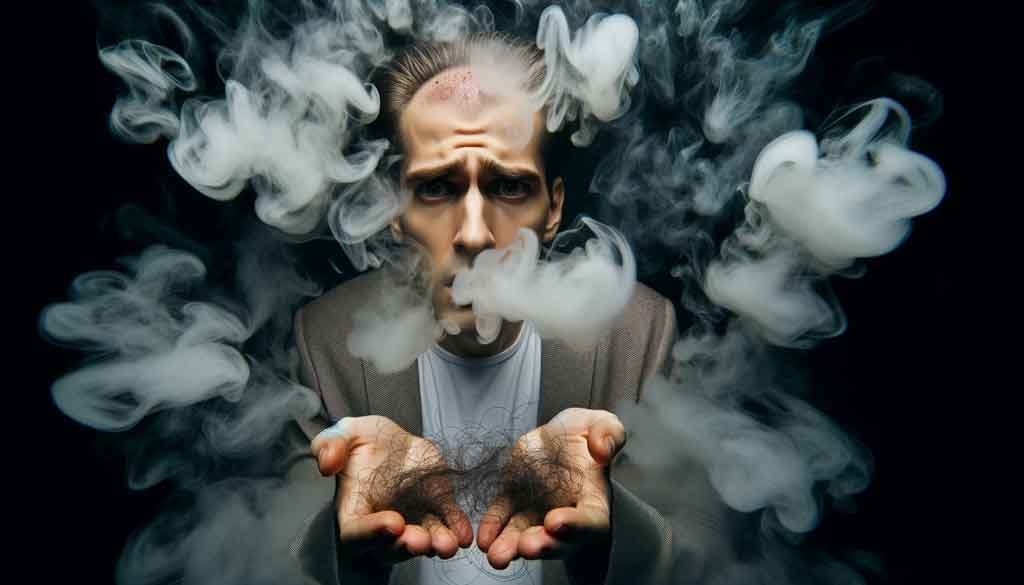Are you worried about your hair, smoker? Listen up because recent research has uncovered a startling connection between smoking and hair loss. Yep, that cigarette in your hand could be causing those thinning locks on your head. In this article, we'll dive into the harmful effects of smoking on your hair and why it happens. But don't fret; we've got your back. We'll also discuss solutions to combat smoking-related hair loss. So, get ready to make positive changes and take control of your hair!
Table of Contents

Smoking and Hair Loss Connection
If you smoke, you may be interested to know that there is a connection between smoking and hair loss. Smoking has been found to accelerate hair loss in both men and women. The chemicals in cigarettes can damage the hair follicles and disrupt the hair growth cycle, leading to thinning hair and baldness. Studies have shown that smokers are more likely to experience premature graying and hair loss than non-smokers. The toxins in cigarettes reduce blood flow to the scalp, depriving the hair follicles of the nutrients they need to grow strong and healthy hair. So, quitting smoking is crucial to maintaining a healthy head of hair. Your hair will thank you for it.
Impact of Smoking on Hair Follicles
Smoking significantly damages hair follicles, leading to accelerated hair loss in both men and women. The impact of smoking on hair follicles is undeniable. Here are five key points to understand the harmful effects of smoking on your hair:
- Smoking restricts blood flow to the hair follicles, depriving them of essential nutrients and oxygen.
- The toxic chemicals in cigarettes weaken the hair shaft, making it brittle and prone to breakage.
- Smoking triggers oxidative stress, which damages the cells in the hair follicles and hinders healthy hair growth.
- The harmful substances in cigarette smoke disrupt the hormonal balance in the body, contributing to hair loss.
- Quitting smoking can help improve blood circulation, reduce oxidative stress, and promote healthier hair growth.
Chemicals in Cigarettes and Hair Loss
By inhaling the chemicals in cigarettes, you expose your hair follicles to harmful substances that can contribute to hair loss. Cigarette smoke contains over 7,000 chemicals, including nicotine, carbon monoxide, formaldehyde, and benzene. These chemicals can disrupt the normal functioning of your hair follicles and impede hair growth. Nicotine, for example, constricts blood vessels and reduces the blood flow to your scalp, depriving your hair follicles of essential nutrients and oxygen. Carbon monoxide, on the other hand, reduces the amount of oxygen carried by your blood, further compromising hair follicle health. Additionally, the toxic chemicals in cigarettes can cause inflammation and oxidative stress, damaging and weakening your hair follicles. So, to maintain a healthy head of hair, it's best to avoid smoking and exposure to secondhand smoke.
Secondhand Smoke and Hair Loss
Exposure to secondhand smoke can contribute to the acceleration of hair loss. Understanding the impact of being around smokers on your hair health is important. Here are a few key points to keep in mind:
- Secondhand smoke contains harmful chemicals that can damage hair follicles and weaken them over time.
- The toxins in cigarette smoke can disrupt the normal hair growth cycle, leading to increased hair shedding and thinner hair.
- Breathing in secondhand smoke can also cause inflammation in the scalp, which can further contribute to hair loss.
- Prolonged exposure to secondhand smoke can worsen existing hair loss conditions, such as androgenetic alopecia.
- Protecting yourself from secondhand smoke by avoiding areas where smoking is allowed can help preserve the health of your hair.
Now that you understand the impact of secondhand smoke on hair loss let's explore the importance of quitting smoking to prevent further damage to your hair.
Quitting Smoking to Prevent Hair Loss
To prevent further damage to your hair, you must quit smoking. Smoking has been found to accelerate hair loss and can worsen existing hair loss conditions. By quitting smoking, you can improve the health of your hair and promote hair growth. Smoking restricts blood flow to the hair follicles, depriving them of essential nutrients and oxygen for healthy hair growth. It also increases oxidative stress and inflammation, further damaging the hair follicles. Quitting smoking benefits your overall health and helps preserve the health and thickness of your hair. It's never too late to make a positive change and protect your hair from the harmful effects of smoking.
Frequently Asked Questions
Can Smoking Cause Hair Loss in Non-Smokers Who Are Exposed to Secondhand Smoke?
Yes, secondhand smoke can potentially cause hair loss in non-smokers. It's important to be aware of the harmful effects of smoking and take steps to minimize exposure to secondhand smoke for your hair and overall health.
Are Any Specific Chemicals in Cigarettes That Are Directly Responsible for Hair Loss?
Yes, specific chemicals in cigarettes can directly cause hair loss. Smoking exposes you to harmful substances like nicotine and carbon monoxide, damaging hair follicles and disrupting growth.
Does Smoking Marijuana Have the Same Effect on Hair Loss as Tobacco Smoking?
Smoking marijuana and tobacco can both harm hair loss. Although more research is needed, smoking can contribute to hair loss due to its effect on blood flow and hormone levels.
Can Quitting Smoking Reverse the Effects of Hair Loss?
Quitting smoking may help reverse the effects of hair loss. Eliminating the harmful chemicals in tobacco smoke allows your body to recover and promote healthier hair growth.
Are There Any Specific Hair Care Products or Treatments That Can Help Combat Hair Loss Caused by Smoking?
There are specific hair care products and treatments that can help combat hair loss caused by smoking. It's best to consult a doctor or dermatologist for personalized recommendations tailored to your needs and to discuss potential treatment options.
References:
Association between smoking and hair loss: another opportunity for health education against smoking?

